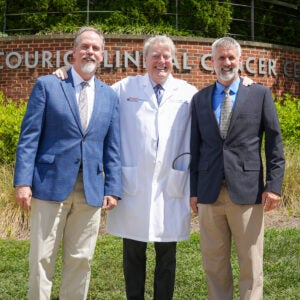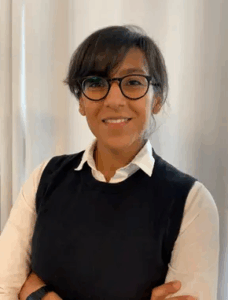News
Recent Highlights
Cancer Center Team Awarded $13 Million to Lead National Study Seeking New Treatments for Acute Myeloid Leukemia
 UVACCC Director Thomas P. Loughran Jr., MD, and Professors of Medicine/Hematology and Oncology Charles Chalfant, PhD, and David Feith, PhD, have been awarded a five-year, $13-million National Cancer Institute (NCI) P01 program project grant to lead a multi-institution, interdisciplinary study seeking new therapies for acute myeloid leukemia (AML). The deadliest form of leukemia, AML is diagnosed at a median age of 68 and its responsiveness to treatment varies between patients. Ten previous years of NCI-funded UVACCC research found that measuring sphingolipids in AML cells can help determine if patients are at greater risk of chemotherapy resistance and should pursue alternate therapies, including clinical trials. The new study seeks to further study and categorize sphingolipids in AML, and to develop and test new treatments delivered via nanotechnology to reduce ceramide metabolites that support the disease’s spread, and replace them with ceramides that will kill it. Read more.
UVACCC Director Thomas P. Loughran Jr., MD, and Professors of Medicine/Hematology and Oncology Charles Chalfant, PhD, and David Feith, PhD, have been awarded a five-year, $13-million National Cancer Institute (NCI) P01 program project grant to lead a multi-institution, interdisciplinary study seeking new therapies for acute myeloid leukemia (AML). The deadliest form of leukemia, AML is diagnosed at a median age of 68 and its responsiveness to treatment varies between patients. Ten previous years of NCI-funded UVACCC research found that measuring sphingolipids in AML cells can help determine if patients are at greater risk of chemotherapy resistance and should pursue alternate therapies, including clinical trials. The new study seeks to further study and categorize sphingolipids in AML, and to develop and test new treatments delivered via nanotechnology to reduce ceramide metabolites that support the disease’s spread, and replace them with ceramides that will kill it. Read more.
‘Mismatched’ Transplants Now Safe for Blood Cancer Patients

Karen Ballen, MD, PhD
In a major advance for treatment of blood cancers, a study co-authored by Professor of Hematology and Oncology Karen Ballen, MD, found that patients can safely receive “mismatched” stem cell transplants by administering the drug cyclophosphamide to prevent graft-versus-host disease. Researchers saw one-year survival rates of 80 percent among 145 patients — similar to outcomes with fully matched donors. Just 10 percent developed moderate to severe complications. Dr. Ballen, UVA Health’s Chief of Hematology/Oncology and Medical Director of Stem Cell Transplants, said all eligible transplant patients at UVA last year were able to find a suitably matched donor thanks to this progress. The findings, published in the Journal of Clinical Oncology, could greatly expand access to lifesaving transplants for leukemia, lymphoma and myelodysplastic syndrome. Read more.
Seham Ebrahim, PhD and Colleagues Discover New Cell Organelle

Seham Ebrahim, PhD
Assistant Professor of Molecular Physiology and Biological Physics Seham Ebrahim, PhD, and colleagues at the National Institutes of Health have discovered an entirely new sub-cellular structure, or organelle, called the hemifusome. Described as a “loading dock” that that helps sort, recycle and discard materials transported inside cells via vesicles, hemifusomes were identified in collaboration with UVA’s Molecular Electron Microscopy Core. Further study could add to our understanding of genetic disorders, Alzheimer’s disease, viral infections, and certain cancers. “Now that we know hemifusomes exist, we can start asking how they behave in healthy cells and what happens when things go wrong,” Dr. Ebrahim said. To learn more, click here.
